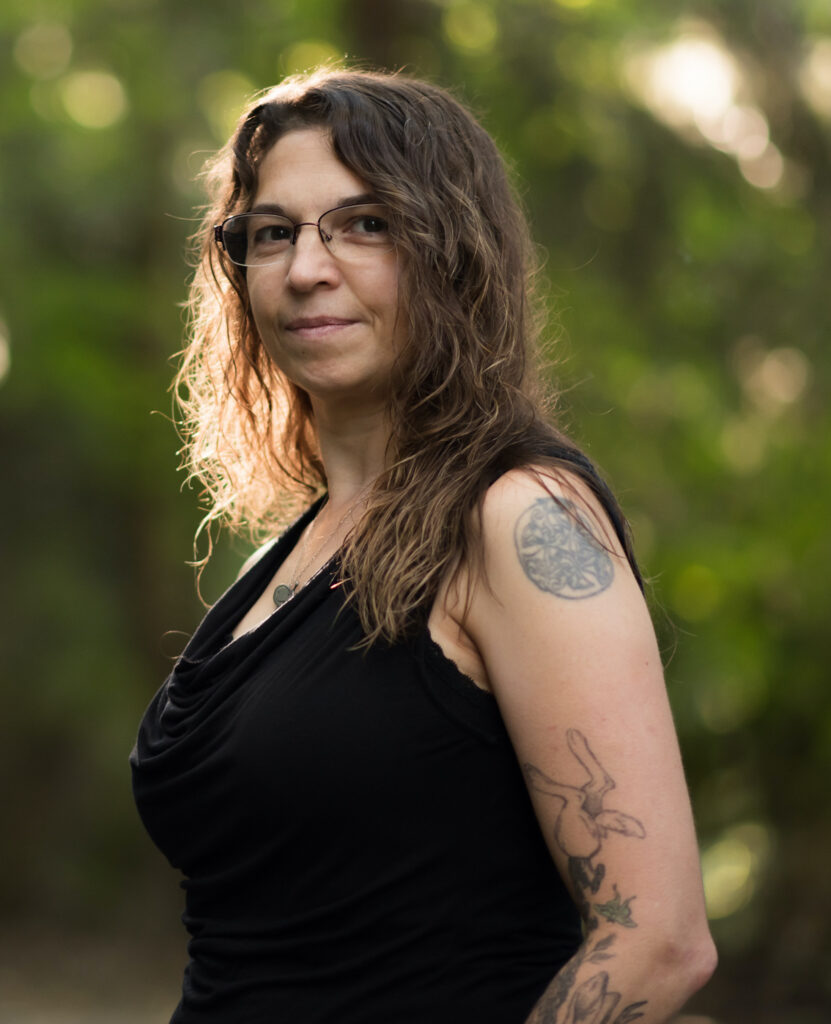We’re thrilled to introduce the 2025 Oregon Literary Fellowship Recipients with individual features on our blog. Out-of-state judges spent several months evaluating the 400+ applications we received, and selected thirteen writers and two publishers to receive grants of $3,500 each. Literary Arts also awarded two Oregon Literary Career Fellowships of $10,000 each. The 2025 Fellowship recipients were recognized at the 2025 Oregon Book Awards Ceremony on April 28, and a public reading event featuring this year’s Fellows will take place on July 8 at Literary Arts.
Brittney Corrigan (she/her) is a 2025 Oregon Literary Fellow in Poetry and the recipient of the C. Hamilton Bailey Fellowship. She is the author of the poetry collections Daughters, Breaking, Navigation, 40 Weeks, and most recently, Solastalgia—a collection of poems about climate change, extinction, and the Anthropocene Age (JackLeg Press, 2023). Brittney was raised in Colorado and has lived in Portland, Oregon for more than three decades, where she is an alumna and employee of Reed College. Her recent debut short story collection, The Ghost Town Collectives, won the 2023 Osprey Award for Fiction from Middle Creek Publishing.

Q&A WITH LITERARY ARTS
What excites you the most about receiving an Oregon Literary Fellowship?
It is very humbling and meaningful to me to be recognized in this way by the literary community I’ve been a part of for so long. I’m thankful for the support, and I’m excited to turn my focus to my next poetry collection, which is just beginning to take shape. Many of the poems in my application were duplexes, a form invented by the poet Jericho Brown with which I’ve recently been experimenting. It feels very validating to have received a fellowship on the merit of these poems, which are a departure from my previous work.
How would you describe your writing process or creative practice?
I’m not the kind of writer who puts words on the page every day. But I do engage with literature on a daily basis as part of my creative practice. I start every morning by reading a handful of poems and picking one to share on my social media channels. I read, listen to podcasts, and talk with fellow writers as a means of inspiration. And I spend a lot of time thinking, often while taking walks through nature. I carry ideas and images for my poems and short stories around in my brain, turning them over and over for quite a while before I sit down to write.
Are there any Oregonian writers you look to for motivation or inspiration?
The poetry community in Oregon is a rich source of inspiration for me. Maxine Scates was my mentor in college back in the 1990s, and I still greatly admire her work. I also love the ways the poet Kristin Berger writes about the natural world, especially the myriad landscapes of our state. The depth with which Endi Bogue Hartigan experiments with form and subject matter are very inspiring to me. And all of the poets of Airlie Press feed my poetic fire.
What projects are you working on right now?
I have several poetry directions that I’ve been exploring recently, and I’m hoping to use this year to hone one or more of them into a manuscript for my next collection. I’ve written a series of poems about wildlife crossings and the interaction of wildlife with roads, the aforementioned duplexes, and several poems about NASA missions and space. I think the new project will likely head off this planet, and I’m particularly interested in thinking about Fermi’s Paradox (the contradiction between the high probability of extraterrestrial life and the lack of any conclusive evidence of it).
Do you have any advice for future applicants?
I’d definitely say, keep applying! I applied many times over a period of several years, in both poetry and fiction, and I’m so glad I kept at it. Don’t be afraid to be bold with your writing sample, to submit something that may be a new direction for you or work that feels vulnerable or takes risks with content or form.
WRITING SAMPLE EXCERPT
JUDGE’S CITATION
“Equal parts blues poem, pantoum, sonnet, and ghazal, the duplex lends itself to temporal transgression, liminality, and multitudes. Corrigan takes the mantle of this contemporary form and infuses it with incisive language and rich emotional stakes that haunt the ear. I was especially floored by ‘Duplex with Fibonacci Sequence’ where Corrigan plays with scale and sequence: ‘Hurricane / where once there were sunflowers, golden’. In this manner, one is reminded that humanity rests upon a symbiosis so tenuous and intricate, we must take time to honor every little miracle.”
– Kweku Abimbola
Applications for the 2026 Oregon Literary Fellowships will open in June. The deadline to apply is August 8, 2025.

